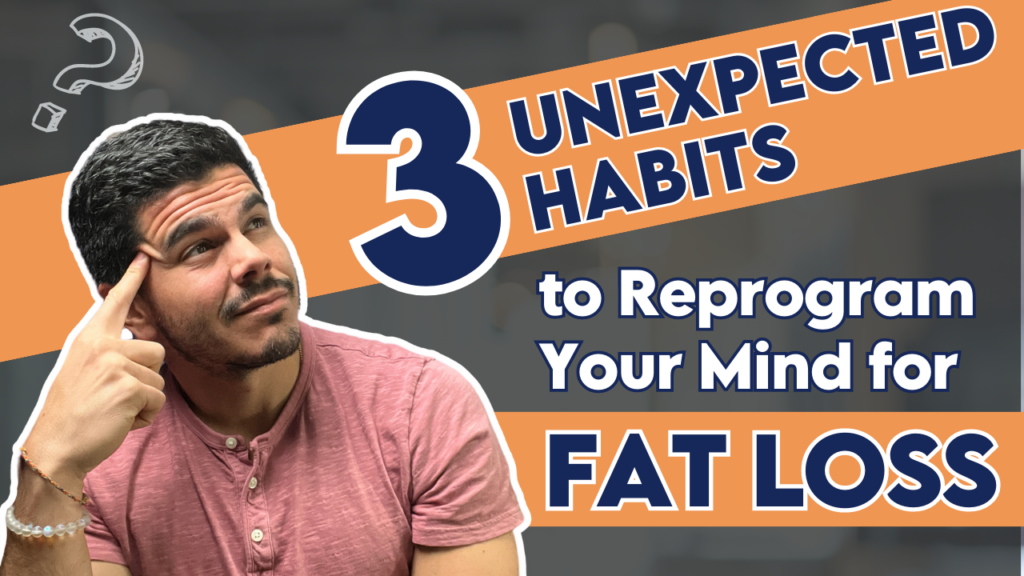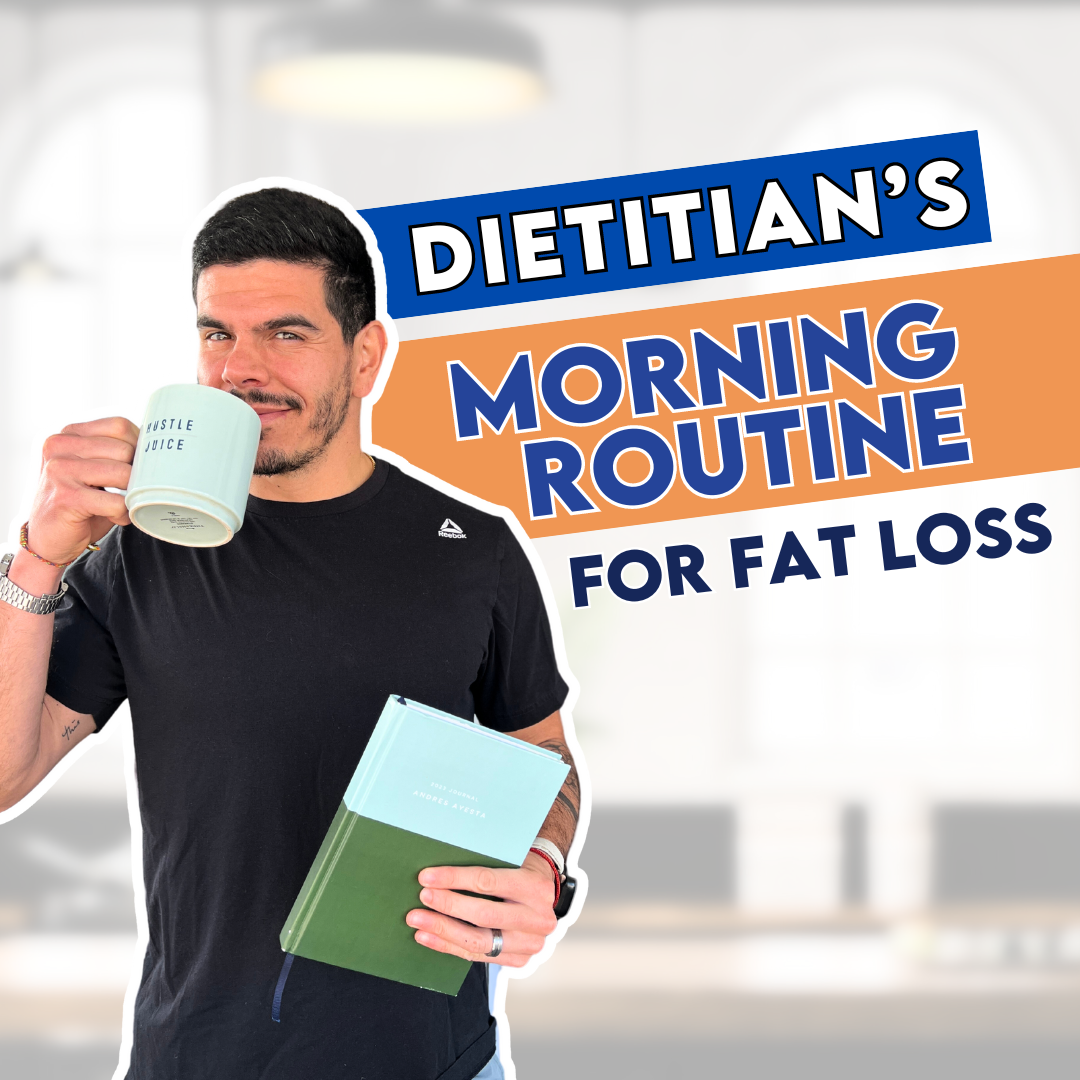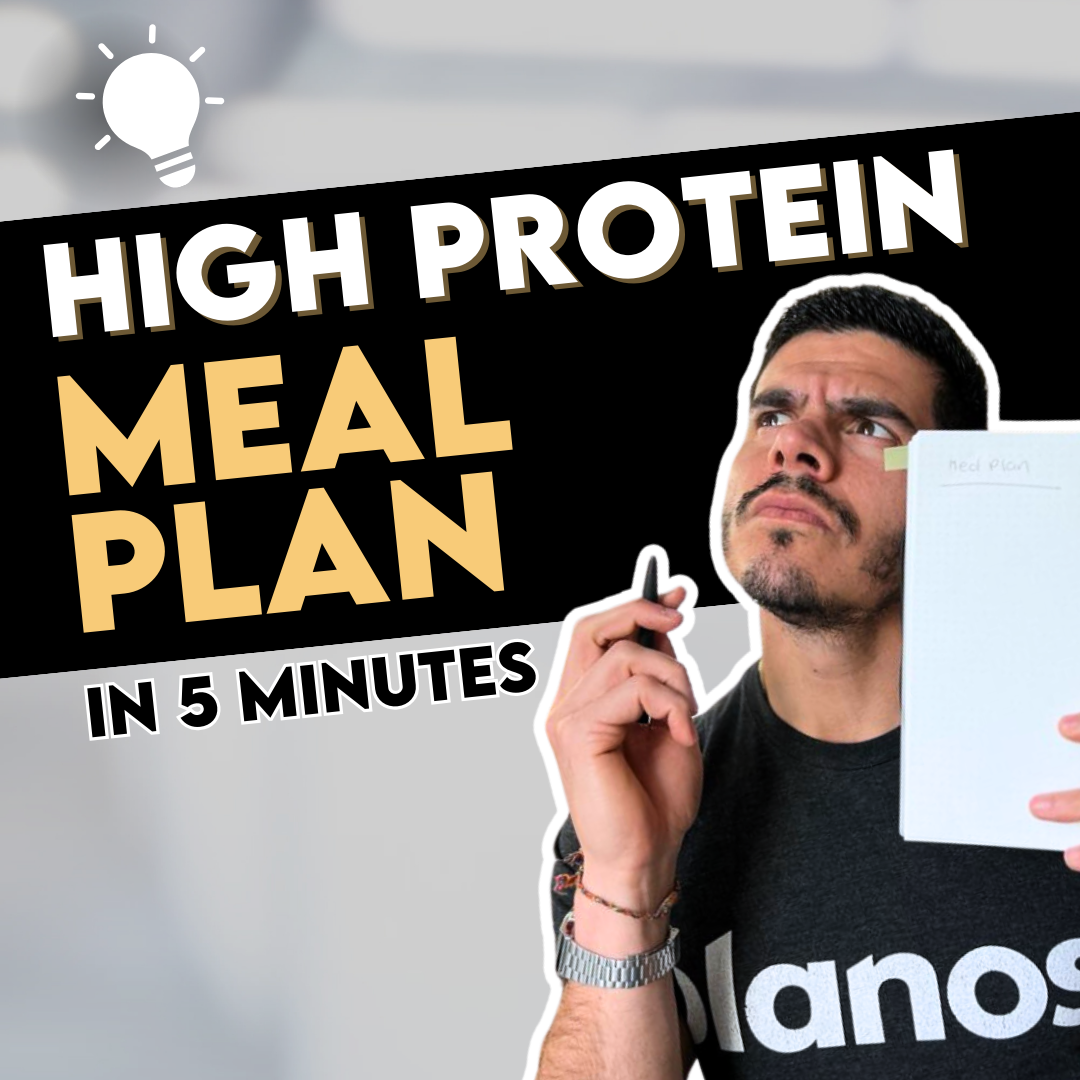Do you have the right weight loss mindset? When it comes to reaching your goals, it’s not all about nutrition and exercise.
Weight Loss Mindset: 3 Unexpected Habits to Reprogram Your Mind for Fat Loss

Do you have the right weight loss mindset?
Over my 12 years as a dietitian, and especially in the past 6 years working with busy professionals and parents to help them improve their lifestyle and shed excess weight, I’ve learned that there is one aspect of weight loss many people overlook.
When we talk about weight loss, the focus is almost always on diets and exercise plans. But there’s something else that people who are successful in losing weight ALWAYS HAVE. And that is an effective weight loss mindset.
The problem is, there is so much information out there on mindset. People are telling you to meditate, say affirmations, manifest what you want, journal, go to therapy, visualize your goals, practice gratitude, and so much more. And don’t get me wrong, all of these habits are great. If you do them, you’ll probably see benefits. But it can be hard to know where to start when you feel like there are so many things you “should” be doing.
In this article, I’m going to share 3 mindset habits that I believe are absolutely critical for fat loss, and they might not be what you expect. These are the habits that my clients have told me over and over again create the biggest mental shifts for them and completely change how they see themselves. And, I’ll also explain why they work so well for helping you reach your fat loss goals, even though they have nothing to do with food.
Weight Loss Mindset Habits
The 3 habits I’m going to share with you today are going to completely transform your fat loss progress. And, these habits are not just going to improve your physical results, they’re also going to increase your happiness and fulfillment, improve your relationships, and bring you more career success.
When I talk about habits, you might think of specific routines, such as waking up at 5am or meditating for 20 minutes each day. But really, habits are anything that is — well — habitual, and this includes certain thinking patterns we’ve developed. You might not think about it this way, but saying critical things about yourself, getting stuck in limiting beliefs, and having certain coping mechanisms that negatively affect your health are all habits.
And just like those habits are created, they can also be replaced and broken. So that’s why I say the habits I’m sharing in this article are unexpected. Because they are changes that target how you think, rather than how you act. Of course, when you think differently, you end up acting differently without too much effort.
Habit #1: Accept & Adapt
This first habit has to do with eliminating the all-or-nothing mentality, which is a type of cognitive distortion. To give you an idea of the habit we’re trying to break here, the all-or-nothing mentality around food and exercise translates to:
“If I haven’t done everything, I haven’t done anything”
When you’re stuck in this mindset, anything less than perfect is considered a failure. This diminishes your ability to celebrate what you HAVE accomplished, and it leads you to quitting over and over again, making it nearly impossible to reach your goals.
So what does this typically look like?
Here is one scenario: you planned on going to a fitness class at your gym, but got stuck at work and are now late.
The all-or-nothing response would be to say, “Well, I’ll only make half of the class. What’s the point? I might as well just go home.” The result is you don’t do any exercise, you’re frustrated that you missed your class, and you haven’t taken any action towards your goals.
The first step to resolving the all-or-nothing mentality and creating a new habit is to recognize when this mindset is showing up in your life. Take some time to reflect right now where this typically happens for you. Once you recognize it’s happening, you can use that as the trigger for your new habit.
So, what is this new habit?
It’s called Accept & Adapt. Step 1 is Accept, which means accepting that perfection every day is unrealistic and sometimes things don’t go as planned. Next, when things don’t go as expected, you have to Adapt your goal. Recognize that something is always better than nothing and is still forward movement. Let’s go back to the example scenario to see this in action.
PUT IT INTO PRACTICE
Accept and adapt would look like saying to yourself: “”I still have 20 minutes and will feel better if I move my body intentionally today, even if it’s shorter than planned.” The outcome here is you get 20 minutes of movement, compared to a grand total of ZERO minutes in the all-or-nothing scenario. You also get a feeling of accomplishment and you make forward progress towards your goals.
Habit #2: Self-Compassion
Maybe you’ve heard of self-compassion before, but many people don’t understand what it actually looks like to practice it. Basically, self-compassion is showing yourself kindness and care when you are struggling. Rather than criticizing yourself for perceived inadequacies and shortcomings, you recognize that you are human; you will make mistakes and things won’t always go the way you plan.
Self-compassion means offering yourself understanding and grace in these situations, and treating yourself the way you would treat a loved one who was experiencing something difficult.
There is even research to support the power this can have. According to Kristin Neff, a researcher in psychology at the University of Austin, people who practice self-compassion are less likely to be critical of themselves and less likely to be anxious or depressed, which, in turn, leads to greater life satisfaction.
PUT IT INTO PRACTICE
On a practical level, this is all about self talk. You know that negative voice that jumps in whenever things go wrong? It’s noticing that voice come up and actively making the choice that you’re going to start supporting yourself.
The way to recognize a moment when you need self-compassion is simply when you feel bad. If your body is feeling uncomfortable or you’re experiencing a negative emotion, that is your self-compassion cue. Then, one of the best ways to start with self-compassion is telling yourself something that you would say to your best friend if they were in a similar situation.
So, how does this help with weight loss? It helps you combat the all-or-nothing mindset we just talked about. When you show yourself compassion, it’s easier to work towards process not perfection and focus on taking care of yourself.
Habit #3: Celebrate Small Wins
Let me tell you about a pattern I see all the time with clients, because it might be a mistake you’re also making that’s sabotaging your weight loss progress. It looks like this:
First, you set an unrealistic goal. You want change so badly and you believe you have to “go big” to succeed. For example, maybe working out every day for an hour AND prepping all your meals AND walking 10,000 steps a day. You might complete that regimen for a week or so, but pretty soon, you’re burnt out and overwhelmed. You begin to feel like a failure, your motivation decreases, and eventually you feel inadequate and give up.
Take a moment to think about this scenario I’ve just described. Is this something you’ve done before?
If so, there is a solution, and here’s what I want your new approach to look like.
First, you set one small goal to focus on. You complete that goal consistently, and it does not increase stress or feel overwhelming because it’s a small, positive change. When you complete it consistently, you feel empowered and motivated. For example, this might be going for a 15 minute walk every morning, or going to the gym 3 times a week. Once you’ve conquered that first goal, you start building on that goal to reach bigger goals.
This is why celebrating small wins is SO IMPORTANT. Set a small goal, achieve it, and celebrate that process. When you feel excited about that, you give yourself positive reinforcement, which gives you more motivation to make progress towards your goals.
PUT IT INTO PRACTICE
I recommend sitting down at the end of every day and writing down 3 wins for that day. When you do this, you’ll go to bed in a positive headspace, and you’ll start looking throughout the day for things that you’re proud of. Pretty soon, you’re no longer looking for ways to criticize yourself. Instead, you’re finding ways you can celebrate your progress.
Conclusion
These 3 habits of Accept & Adapt, Self-Compassion, and Celebrating Small Wins are how you reprogram your mind for fat loss. It’s not about one instant mindset shift or saying one positive affirmation, it’s doing the daily work of noticing when you’re getting into negative thought habits and actively replacing those habits. Pretty soon, the new thought patterns become your go-to responses. When this happens, all the other things that support fat loss, such as eating healthy and exercising become so much simpler because you’ve freed yourself from so much negativity and resistance, and what you have left is taking imperfect but consistent steps towards your goals each day.
TO CONNECT WITH ME
Instagram: www.instagram.com/andresayesta
TikTok: https://vm.tiktok.com/tLLoyS/
Youtube www.youtube.com/c/andresayesta
Podcast IG page: www.instagram.com/planos_nutrition
Facebook: https://www.facebook.com/planosnutrition
FREE RESOURCES
Macro Counting Guide https://www.planosnutrition.co/free-macro-guide
Macro-Friendly Meal Planning Guide https://www.planosnutrition.co/freemealplanguide
TO JOIN OUR PRIVATE FACEBOOK COMMUNITY
Not Another Diet Community: https://www.facebook.com/groups/notanotherdietcommunity
FOR NUTRITION COACHING
Apply here at https://planosnutrition.com
explore more
explore more


